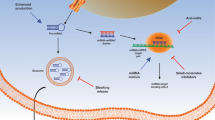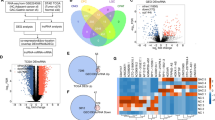Abstract
Esophageal squamous cell cancer (ESCC) is an aggressive malignancy with poor survival. Long non-coding RNAs (lncRNAs) play important roles in tumorigenesis and cancer progression; hence, lncRNAs are also involved in the development and progression of ESCC. In this study, we used quantitative real-time polymerase chain reaction (qRT-PCR) to investigate expression of lncRNA, maternally expressed gene 3 (MEG3) in ESCC. Ectopic expression of MEG3 was performed in ESCC cell lines. Proliferation and apoptosis of ESCC cell lines were analyzed after ectopic expression of MEG3. We found MEG3 was significantly downregulated in ESCC tissues compared with normal tissues by qRT-PCR. Low expression of MEG3 was correlated with lymph node metastasis and advanced TNM stages of ESCC patients and indicated shorter survival (HR = 0.471, 95 % CI 0.234–0.950, P = 0.035), which was confirmed by The Cancer Genome Atlas (TCGA) esophageal cancer dataset. DNA-demethylating agent (5-aza-2-deoxy-cytidine (5-aza-CdR)) treatment significantly increased MEG3 expression level in ESCC cells, and TCGA esophageal cancer dataset also showed that DNA methylation of MEG3 predicted survival. Ectopic expression of MEG3 in ESCC cells inhibited cell proliferation, promoted apoptosis, and suppressed metastasis. Further investigation showed enforced expression of MEG3 activated p53 and its target genes by downregulation of mouse double minute 2 homolog (MDM2). Overall, our study indicated that MEG3 expression loss is common in ESCC and MEG3 could activate p53 and predict prognosis in ESCC.




Similar content being viewed by others
References
Parkin DM, Bray F, Ferlay J, Pisani P. Global cancer statistics, 2002. CA Cancer J Clin. 2005;55(2):74–108.
Qi YJ, Chao WX, Chiu JF. An overview of esophageal squamous cell carcinoma proteomics. J Proteome. 2012;75(11):3129–37. doi:10.1016/j.jprot.2012.04.025.
Holmes RS, Vaughan TL. Epidemiology and pathogenesis of esophageal cancer. Semin Radiat Oncol. 2007;17(1):2–9. doi:10.1016/j.semradonc.2006.09.003.
Yang L, Parkin DM, Ferlay J, Li L, Chen Y. Estimates of cancer incidence in China for 2000 and projections for 2005. Cancer Epidemiol Biomark Prev. 2005;14(1):243–50.
Ponting CP, Oliver PL, Reik W. Evolution and functions of long noncoding RNAs. Cell. 2009;136(4):629–41. doi:10.1016/j.cell.2009.02.006.
Wilusz JE, Sunwoo H, Spector DL. Long noncoding RNAs: functional surprises from the RNA world. Genes Dev. 2009;23(13):1494–504. doi:10.1101/gad.1800909.
Qiu MT, JW H, Yin R, Xu L. Long noncoding RNA: an emerging paradigm of cancer research. Tumour Biol. 2013;34(2):613–20. doi:10.1007/s13277-013-0658-6.
Esteller M. Non-coding RNAs in human disease. Nat Rev Genet. 2011;12(12):861–74. doi:10.1038/nrg3074.
Tsai MC, Spitale RC, Chang HY. Long intergenic noncoding RNAs: new links in cancer progression. Cancer Res. 2011;71(1):3–7. doi:10.1158/0008-5472.CAN-10-2483.
Schmidt LH, Spieker T, Koschmieder S, Schaffers S, Humberg J, Jungen D, et al. The long noncoding MALAT-1 RNA indicates a poor prognosis in non-small cell lung cancer and induces migration and tumor growth. J Thorac Oncol. 2011;6(12):1984–92. doi:10.1097/JTO.0b013e3182307eac.
Gupta RA, Shah N, Wang KC, Kim J, Horlings HM, Wong DJ, et al. Long non-coding RNA HOTAIR reprograms chromatin state to promote cancer metastasis. Nature. 2010;464(7291):1071–6. doi:10.1038/nature08975.
Yang L, Lin C, Liu W, Zhang J, Ohgi KA, Grinstein JD, et al. ncRNA- and Pc2 methylation-dependent gene relocation between nuclear structures mediates gene activation programs. Cell. 2011;147(4):773–88. doi:10.1016/j.cell.2011.08.054.
Tseng YY, Moriarity BS, Gong W, Akiyama R, Tiwari A, Kawakami H, et al. PVT1 dependence in cancer with MYC copy-number increase. Nature. 2014;512(7512):82–6. doi:10.1038/nature13311.
Li W, Zheng J, Deng J, You Y, Wu H, Li N, et al. Increased levels of the long intergenic non-protein coding RNA POU3F3 promote DNA methylation in esophageal squamous cell carcinoma cells. Gastroenterology. 2014;146(7):1714–26 e5. doi:10.1053/j.gastro.2014.03.002.
Benetatos L, Vartholomatos G, Hatzimichael E. MEG3 imprinted gene contribution in tumorigenesis. Int J Cancer. 2011;129(4):773–9. doi:10.1002/ijc.26052.
Balik V, Srovnal J, Sulla I, Kalita O, Foltanova T, Vaverka M, et al. MEG3: a novel long noncoding potentially tumour-suppressing RNA in meningiomas. J Neuro-Oncol. 2013;112(1):1–8. doi:10.1007/s11060-012-1038-6.
Zhou Y, Zhang X, Klibanski A. MEG3 noncoding RNA: a tumor suppressor. J Mol Endocrinol. 2012;48(3):R45–53. doi:10.1530/JME-12-0008.
Xia Y, He Z, Liu B, Wang P, Chen Y. Downregulation of Meg3 enhances cisplatin resistance of lung cancer cells through activation of the WNT/beta-catenin signaling pathway. Mol Med Rep. 2015;12(3):4530–7. doi:10.3892/mmr.2015.3897.
Ying L, Huang Y, Chen H, Wang Y, Xia L, Chen Y, et al. Downregulated MEG3 activates autophagy and increases cell proliferation in bladder cancer. Mol BioSyst. 2013;9(3):407–11. doi:10.1039/c2mb25386k.
KH L, Li W, Liu XH, Sun M, Zhang ML, WQ W, et al. Long non-coding RNA MEG3 inhibits NSCLC cells proliferation and induces apoptosis by affecting p53 expression. BMC Cancer. 2013;13:461. doi:10.1186/1471-2407-13-461.
Zhang X, Gejman R, Mahta A, Zhong Y, Rice KA, Zhou Y, et al. Maternally expressed gene 3, an imprinted noncoding RNA gene, is associated with meningioma pathogenesis and progression. Cancer Res. 2010;70(6):2350–8. doi:10.1158/0008-5472.CAN-09-3885.
Zhou Y, Zhong Y, Wang Y, Zhang X, Batista DL, Gejman R, et al. Activation of p53 by MEG3 non-coding RNA. J Biol Chem. 2007;282(34):24731–42. doi:10.1074/jbc.M702029200.
Consortium EP, Birney E, Stamatoyannopoulos JA, Dutta A, Guigo R, Gingeras TR, et al. Identification and analysis of functional elements in 1 % of the human genome by the ENCODE pilot project. Nature. 2007;447(7146):799–816. doi:10.1038/nature05874.
Louro R, Smirnova AS, Verjovski-Almeida S. Long intronic noncoding RNA transcription: expression noise or expression choice? Genomics. 2009;93(4):291–8. doi:10.1016/j.ygeno.2008.11.009.
Su X, Malouf GG, Chen Y, Zhang J, Yao H, Valero V, et al. Comprehensive analysis of long non-coding RNAs in human breast cancer clinical subtypes. Oncotarget. 2014;5(20):9864–76. doi:10.18632/oncotarget.2454.
Khalili-Azad T, Razmkhah M, Ghiam AF, Doroudchi M, Talei AR, Mojtahedi Z, et al. Association of interleukin-18 gene promoter polymorphisms with breast cancer. Neoplasma. 2009;56(1):22–5.
Li Y, Wang Z, Shi H, Li H, Li L, Fang R, et al. HBXIP and LSD1 scaffolded by lncRNA Hotair mediate transcriptional activation by c-Myc. Cancer Res. 2015. doi:10.1158/0008-5472.CAN-14-3607.
Anko ML, Neugebauer KM. Long noncoding RNAs add another layer to pre-mRNA splicing regulation. Mol Cell. 2010;39(6):833–4. doi:10.1016/j.molcel.2010.09.003.
Yan J, Guo X, Xia J, Shan T, Gu C, Liang Z, et al. MiR-148a regulates MEG3 in gastric cancer by targeting DNA methyltransferase 1. Med Oncol. 2014;31(3):879. doi:10.1007/s12032-014-0879-6.
Braconi C, Kogure T, Valeri N, Huang N, Nuovo G, Costinean S, et al. microRNA-29 can regulate expression of the long non-coding RNA gene MEG3 in hepatocellular cancer. Oncogene. 2011;30(47):4750–6. doi:10.1038/onc.2011.193.
Zhang J, Yao T, Wang Y, Yu J, Liu Y, Lin Z. Long noncoding RNA MEG3 is downregulated in cervical cancer and affects cell proliferation and apoptosis by regulating miR-21. Cancer Biol Ther. 2015. doi:10.1080/15384047.2015.1108496.
Luo G, Wang M, Wu X, Tao D, Xiao X, Wang L, et al. Long non-coding RNA MEG3 inhibits cell proliferation and induces apoptosis in prostate cancer. Cell Physiol Biochem. 2015;37(6):2209–20. doi:10.1159/000438577.
Mondal T, Subhash S, Vaid R, Enroth S, Uday S, Reinius B, et al. MEG3 long noncoding RNA regulates the TGF-beta pathway genes through formation of RNA-DNA triplex structures. Nat Commun. 2015;6:7743. doi:10.1038/ncomms8743.
Acknowledgments
None
Author information
Authors and Affiliations
Corresponding author
Ethics declarations
The study was approved by the Ethics Committee of the Second Affiliated Hospital of Dalian Medical University. The written informed consent was obtained from every patient.
Conflicts of interest
None
Rights and permissions
About this article
Cite this article
Lv, D., Sun, R., Yu, Q. et al. The long non-coding RNA maternally expressed gene 3 activates p53 and is downregulated in esophageal squamous cell cancer. Tumor Biol. 37, 16259–16267 (2016). https://doi.org/10.1007/s13277-016-5426-y
Received:
Accepted:
Published:
Issue Date:
DOI: https://doi.org/10.1007/s13277-016-5426-y




